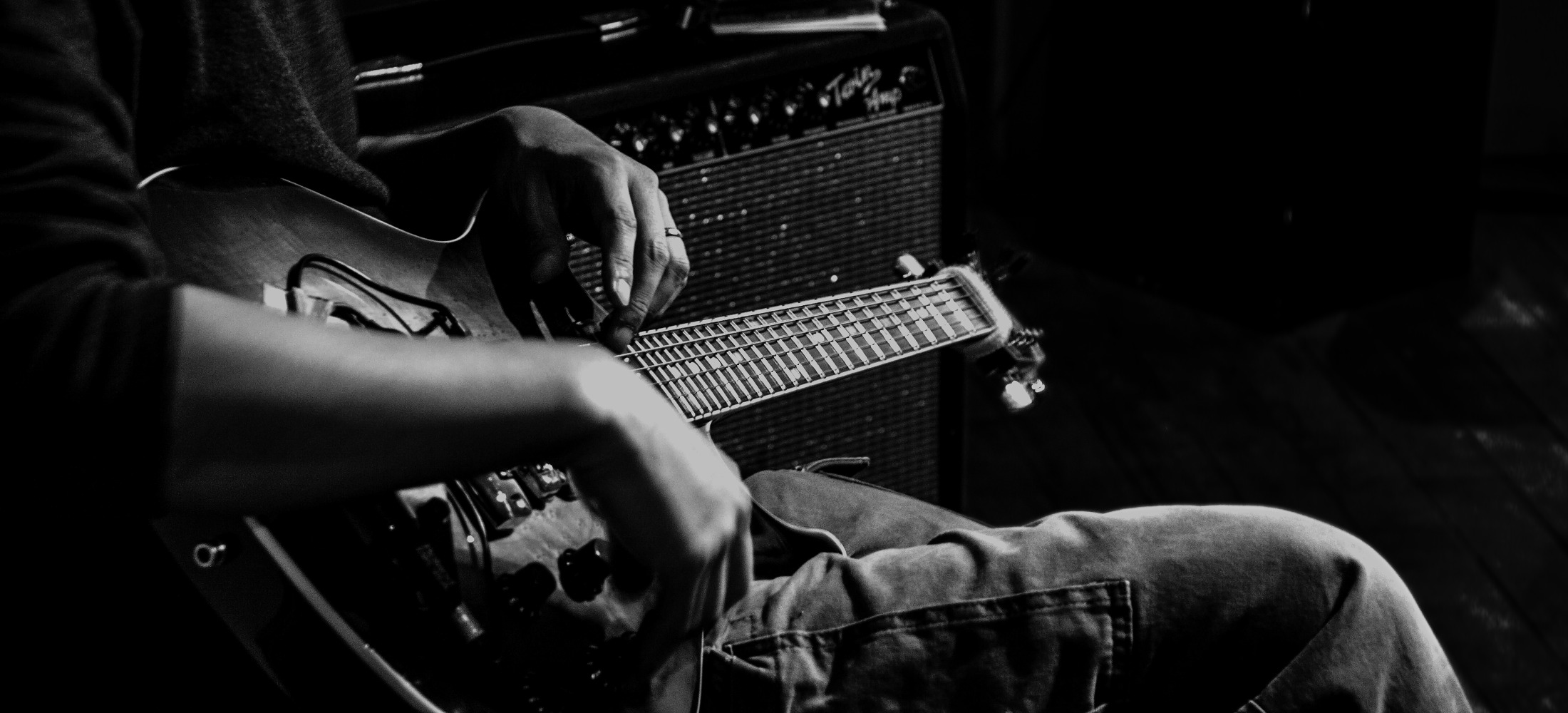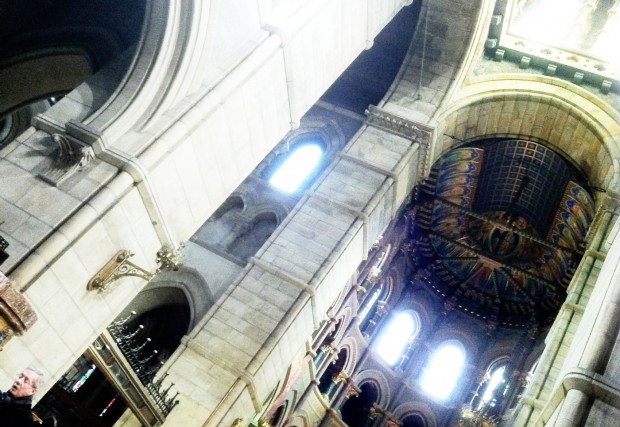
Last minute performance announcement: tomorrow (Sunday, November 30, 2014), at 3:00pm, I’m performing as part of an improv meet with Tom Buckner and others. The event takes place at The Guesthouse (10 Chapel Street, Shandon, Cork, Ireland).
thanks: Han-earl Park, Dominic Lash and Mark Sanders (Birmingham and London, October 2014)
Quick note of thanks to all involved in the October 28 and October 30 performances. Thanks mightily to Cath Roberts and Dee Byrne, instigators of LUME, and Andrew Woodhead, the new mastermind behind Fizzle, for hosting the performances, and for their support and enthusiasm. Thanks to Ben Lee (who also managed Fizzle on the night) and Roberto Sassi (and Roland Ramanan for the intro) for allowing this itinerant guitarist to borrow the use of their amplifiers. Thanks to the other ensembles who shared the bill: Lee Allatson, Stewart Brackley and Bruce Coates (Lee, Bruce, great to see you guys again!); and Sam Andreae and Rodrigo Constanzo.
Mondo kudos to Dom Lash and Mark Sanders. I am indebted to these two smart, perceptive, crafty and imaginative improvisers. They make every moment sound that much more brilliant, and every turn that much more unexpected. Looking forward to playing again! (tell your local music org to book us! 😉
Finally, as always, thanks to all who came to listen to the real-time noise, and to witness the jump-cuts between chaotic frenzy and delicate, pretty open spaces. It’s been a while since I performed in these two cities; always a pleasure.
excerpt: Han-earl Park, Dominic Lash and Mark Sanders at Fizzle, Birmingham
In anticipation of the performance tonight (October 30) with Dominic Lash and Mark Sanders, I’ve uploaded a short clip from our October 28 performance at Fizzle, Birmingham. Taken from the last few minutes of our first improvisation, I think the breadth of landscape the ensemble covers in that short time is impressive. [More about this performance…]
In a few hours, Han-earl Park, Dominic Lash and Mark Sanders will be performing at LUME (Long White Cloud, 151 Hackney Road, London E2 8JL). Come down for more real-time, interactive noise and serendipity.
tomorrow: Han-earl Park, Dominic Lash and Mark Sanders at LUME, London

Tomorrow night (Thursday, October 30, 2014), at 8:30pm (doors: 8:00pm): LUME presents Han-earl Park (guitar), Dominic Lash (double bass) and Mark Sanders (drums), plus Strikethrough Me & You (Sam Andreae and Rodrigo Constanzo), at Long White Cloud (151 Hackney Road, London E2 8JL) [map…]. Admission is £5.
reminder: Han-earl Park, Dominic Lash and Mark Sanders at Fizzle, Birmingham

This coming Tuesday (October 28, 2014), at 8:00pm: Fizzle presents Han-earl Park (guitar), Dominic Lash (double bass) and Mark Sanders (drums), plus A, B & C (Lee Allatson: drums; Stewart Brackley: bass and voice; and Bruce Coates: saxophones). The event takes place at The Lamp Tavern (Barford Street, Birmingham B5 6AH) [map…]. Admission is £5 (£3).
If you can’t make this one, on Thursday (October 30), Han-earl Park, Dominic Lash and Mark Sanders are also performing at LUME (Long White Cloud, 151 Hackney Road, London E2 8JL).
reminder: Han-earl Park, Roslyn Steer and Dan Walsh, with Kevin Terry and John Godfrey at The Roundy, Cork
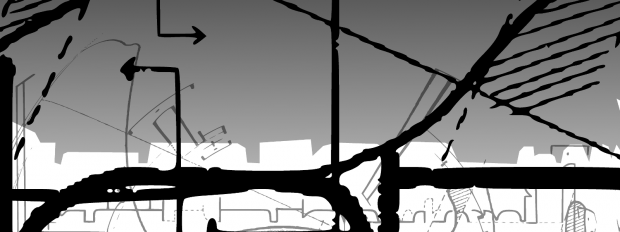
This coming Monday (20 October 2014), at 8:30pm (doors: 8:15pm): Han-earl Park (guitar), Roslyn Steer (bass) and Dan Walsh (drums), with Kevin Terry (guitar) and John Godfrey (guitar) perform Upstairs at The Roundy (Castle Street, Cork, Ireland) [map…]. Admission is one euro note of your choice (€5/10/20…) at the door.
update: Han-earl Park, Roslyn Steer and Dan Walsh, with Caroline Pugh and Tony O’Connor at The Roundy, Cork
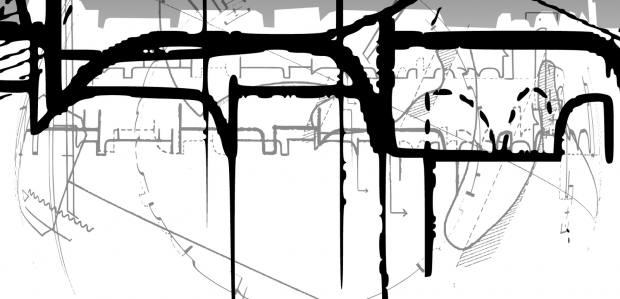
This Sunday (September 28, 2014), at 8:30pm (doors: 8:15pm): Han-earl Park (guitar), Roslyn Steer (bass), Dan Walsh (drums) and Tony O’Connor (bass) plus very special guest Caroline Pugh (voice) perform Upstairs at The Roundy (Castle Street, Cork, Ireland) [map…]. Admission is one euro note of your choice (€5/10/20…) at the door.
performances: Han-earl Park, Roslyn Steer and Dan Walsh, with Tony O’Connor, Kevin Terry and John Godfrey at The Roundy, Cork
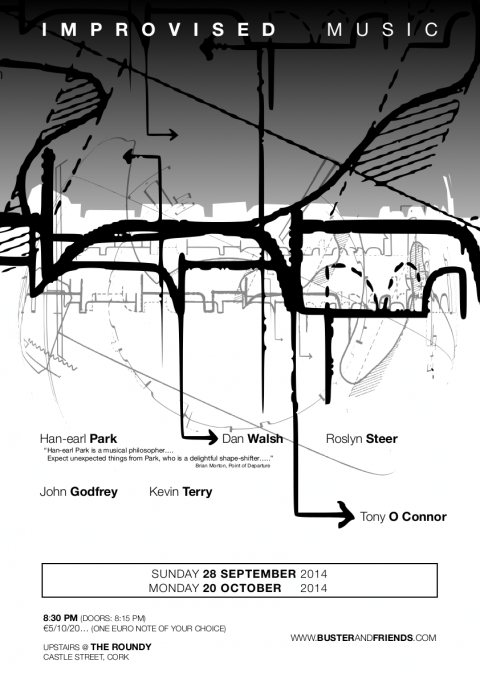
Sunday, September 28 and Monday, October 20, 2014, at 8:30pm (doors: 8:15pm): performances by Han-earl Park (guitar), Roslyn Steer (bass) and Dan Walsh (drums), plus guests including Caroline Pugh, Tony O’Connor, Kevin Terry and John Godfrey, take place Upstairs at The Roundy (Castle Street, Cork, Ireland) [map…]. Admission is one euro note of your choice (€5/10/20…) at the door.
See the performance diary for up-to-date info. [The Roundy page: Sep 28…] [Facebook event: Sep 28…] [Facebook event: Oct 20…]
updates
09–24–14: add Caroline Pugh to the September 28 lineup.
performances: Han-earl Park, Dominic Lash and Mark Sanders (Birmingham and London, October 2014)

October 2014: performances by Han-earl Park (guitar), Dominic Lash (double bass) and Mark Sanders (drums), Birmingham and London, England.
- Birmingham, October 28, 2014, 8:00pm: Fizzle presents Park-Lash-Sanders, plus A, B & C (Lee Allatson: drums; Stewart Brackley: bass and voice; and Bruce Coates: saxophones), at The Lamp Tavern (Barford Street, Birmingham B5 6AH) [map…].
Admission: £5 (£3).
[Performance diary entry…] [Fizzle listings…] [Facebook event…] - London, October 30, 2014, 8:30pm (doors: 8:00pm): LUME presents Park-Lash-Sanders, plus Strikethrough Me & You (Sam Andreae and Rodrigo Constanzo), at Long White Cloud (151 Hackney Road, London E2 8JL) [map…].
Admission: £5.
[Performance diary entry…] [LUME page…] [Facebook event…]
See the performance diary for up-to-date info.
about the performers
Improviser, guitarist and constructor Han-earl Park has been crossing borders and performing fuzzily idiomatic, on occasion experimental, always traditional, open improvised musics for twenty years. He has performed in clubs, theaters, art galleries, concert halls, and (ad-hoc) alternative spaces across Europe and the USA.
Park engages a radical, liminal, cyborg virtuosity in which mind, body and artifact collide. He is driven by the social and revolutionary potential of real-time interactive performance in which tradition and practice become creative problematics. As a constructor of musical automata, he is interested in partial, and partially frustrating, context-specific artifacts; artifacts that amplify social relations and corporeal identities and agencies.
Ensembles include Mathilde 253 with Charles Hayward and Ian Smith, Eris 136199 with Nick Didkovsky and Catherine Sikora, and Numbers with Richard Barrett. Park is the constructor of the machine improviser io 0.0.1 beta++, and instigator of Metis 9, a playbook of improvisative tactics. He has performed with Wadada Leo Smith, Paul Dunmall, Evan Parker, Lol Coxhill, Mark Sanders, Josh Sinton, Louise Dam Eckardt Jensen, Gino Robair, Tim Perkis, Andrew Drury, Pat Thomas and Franziska Schroeder, and as part of large ensembles led by Wadada Leo Smith, Evan Parker and Pauline Oliveros.
Festival appearances include Freedom of the City (London), Sonorities (Belfast), ISIM (New York), dialogues festival (Edinburgh), CEAIT (Los Angeles) and Sonic Acts (Amsterdam). His recordings have been released by labels including Slam Productions, Creative Sources and DUNS Limited Edition.
Park taught improvisation at University College Cork, and founded and curated Stet Lab, a space for improvised music in Cork.
“Guitarist Han-earl Park is a musical philosopher…. Expect unexpected things from Park, who is a delightful shape-shifter….”
Brian Morton (Point of Departure)
Dominic Lash is a freely improvising double bassist, although his activities also range much more widely and include playing bass guitar and other instruments; both writing and performing composed music; and writing about music and various other subjects.
He has performed with musicians such as Tony Conrad (in duo and quartet formations), Joe Morris (trio and quartet), Evan Parker (duo, quartet and large ensemble) and the late Steve Reid. His main projects include The Dominic Lash Quartet, The Set Ensemble (an experimental music group focused on the work of the Wandelweiser collective) and The Convergence Quartet.
Based in Bristol, Lash has performed in the UK, Austria, Finland, France, Germany, the Netherlands, Norway, Spain, Switzerland, Turkey and USA. For nearly a decade he was based in Oxford and played a central role in the activities of Oxford Improvisers; much of 2011 was spent living in Manhattan. In 2013 and 2014 he is taking part in Take Five, the professional development programme administered by Serious.
Festival appearances include Akbank Jazz Festival (Istanbul), Audiograft (Oxford), Freedom of the City (London), Huddersfield Contemporary Music Festival, Hurta Cordel (Madrid), Konfrontationen (Nickelsdorf), LMC Festival (London), Manchester Jazz Festival and Tampere Jazz Happening.
His work has been broadcast on a number of radio stations, including BBC Radios 1 and 3 and Germany’s SWR2, and released on labels including Another Timbre, b-boim, Bead, Cathnor, Clean Feed, Compost and Height, Emanem, Erstwhile, FMR, Foghorn, Leo and NoBusiness.
Since moving to Bristol he has been involved in organising concerts under the banners of Bang the Bore and Insignificant Variation. A new venture is the monthly series happening every second Wednesday at the Arnolfini entitled Several 2nds. Events include performances, workshops, film screenings and discussions.
“Following in an illustrious lineage from Barry Guy through Simon Fell… breathtaking.”
John Sharpe (All About Jazz)
Mark Sanders has played with many renowned musicians from around the world including Evan Parker, Peter Brotzmann, Derek Bailey, Myra Melford, Paul Rogers, Henry Grimes, Roswell Rudd, Okkyung Lee, Barry Guy, Tim Berne, Otomo Yoshihide, Luc Ex, Ken Vandermark, Sidsel Endresen and Jean Francois Pauvrois, in duo and quartets with Wadada Leo Smith and trios with Charles Gayle with Sirone and William Parker.
New collaborative projects include ‘Riverloam Trio’ with Mikolaj Trzaska and Olie Brice, ‘Asunder’ with Hasse Poulsen and Paul Dunmall, duos with John Butcher and DJ Sniff, ‘Statics’ with Georg Graewe and John Butcher, and trio with Rachel Musson and Liam Noble.
Mark and John Edwards play as a rhythm section with many groups including Trevor Watts Quartet, ‘Foils’ with Frank Paul Schubert and Matthius Muller, Mathew Shipp’s ‘London Quartet,’ also playing with Fred Frith, Wadada Leo Smith and Shabaka Hutchins amongst many others.
Christian Marclay’s ‘Everyday’ project includes Mark with Christian, Steve Beresford, John Butcher and Alan Tomlinson, he also works regularly in the projects of Mikolaj Trzaska, Gail Brand, Paul Dunmall, Peter Jaquemyn, and Simon H. Fell.
Mark has performed in the USA, Canada, Brazil, Japan, Morrocco, South Africa, Mozambique and Turkey, playing at many major festivals including, Nickelsdorf, Ulrichsburg, Glastonbury, Womad, Vancouver, Isle of Wight, Roskilde, Berlin Jazz days, Mulhouse, Luz, Minniapolis, Banlieue Bleues, Son D’hiver and Hurta Cordel.
He has released over 120 CDs.
“A gifted player capable of seamless movement between free-rhythms and propulsive swing.”
John Fordham (The Guardian)
updates
10-24-14: add link to LUME page and Fizzle listings.
performance diary 08-16-14 (Birmingham, Cork, London)
| date | venue | time | details |
|---|---|---|---|
| September 28, 2014 | The Roundy Castle Street Cork, Ireland |
8:30pm (doors: 8:15pm) | Han-earl Park (guitar), Roslyn Steer (bass) and Dan Walsh (drums), with Caroline Pugh (voice) and Tony O’Connor (bass). Admission: One euro note (€5/10/20…). [Details…] [The Roundy page…] |
| October 20, 2014 | The Roundy Castle Street Cork, Ireland |
8:30pm (doors: 8:15pm) | Han-earl Park (guitar), Roslyn Steer (bass) and Dan Walsh (drums), with John Godfrey (guitar) and Kevin Terry (guitar). Admission: One euro note (€5/10/20…). [Details…] |
| October 28, 2014 | The Lamp Tavern Barford Street Birmingham B5 6AH England |
8:00pm | Han-earl Park (guitar), Dominic Lash (double bass) and Mark Sanders (drums) presented by Fizzle. Also performing: A, B & C (Lee Allatson: drums; Stewart Brackley: bass and voice; and Bruce Coates: saxophones). Admission: £5 (£3). [Details…] [Fizzle listings…] |
| October 30, 2014 | Long White Cloud 151 Hackney Road London E2 8JL England |
8:30pm (doors: 8:00pm) | Han-earl Park (guitar), Dominic Lash (double bass) and Mark Sanders (drums) presented by LUME. Also performing: Strikethrough Me & You (Sam Andreae and Rodrigo Constanzo). Admission: £5. [Details…] [LUME page…] |
| 2014– | Europe | I am based in Europe as of 2014, and I am seeking performance opportunities for, in particular, my Europe-based projects including Numbers (with Richard Barrett), Mathilde 253 (with Charles Hayward and Ian Smith). Interested promoters, venues and sponsors, please get in touch! |
| 2015 | UK | Seeking performance opportunities for the quartet of Josh Sinton (saxophone and clarinet), Han-earl Park (guitar), Adam Hopkins (double bass) and Dominic Lash (double bass) in the UK, early/mid 2015. Interested promoters, venues and sponsors, please get in touch! |
Continue reading “performance diary 08-16-14 (Birmingham, Cork, London)”
thanks: Eris 136199 (ISIM, NYC), Rasmussen-Foster-Niggenkemper-Park (DMG, NYC) and Park-Rainey (Why Not Jazz Room, NYC)
A belated note of thanks for all involved in the June 6, June 6 (no that’s not a typo—two performances on that day), and June 8 events. Thanks to the folk at ISIM, and in particular to Richard Robeson, Billy Satterwhite and Ed Sarath for organizing, curating and facilitating the event, and to Christopher Hoffman for the tech support; to Bruce and everyone at Downtown Music Gallery, the World’s Greatest Record Store (seriously, go buy a record from them right now); and to Andrea Wolper and her amazing series, and to Why Not Jazz Room. Thanks also to the multiple documentarists: videographers Don Mount and Juan Ant [watch/listen…], and to photographer Peter Gannushkin [see…].
As always, big thanks to the creative folk who shared the stage with me; it’s always a privilege. Applaud these folk: Mette Rasmussen, Michael Foster, Pascal Niggenkemper; Tom Rainey (how does one perform with a drummer who can anticipate every move?); and the two that complete Eris 136199: Nick Didkovsky and Catherine Sikora (always a blast).
Finally, thanks to all who came to listen. That’s to be my last visit to New York for sometime, and, audience big or small, it’s always a pleasure to perform for you.
Lost at the Border: Improvisation, Conservation and Transformation (a twitter transcript)
Previte: “I’m a bit of a mongrel.” #isim2014
…and w/ that simple statement, is not the enterprise of Cross-Cultural Improvisation nuked? #isim2014
More tweets from an institutionally unaffiliated, sometimes teacher, amateur scholar and anthropologist [a previous twitter transcript…]. Below is an unedited transcript of my observations from ISIM: Cross-Cultural Improvisation III. My original observations came in the form of live tweets via @hanearlpark that spanned the opening ceremony on June 5, the conference plus performances between June 6 and 8, plus some post-event reflections.
My questions and observations are indebted to discussions with @AndreaWolper, @jkais, @nickreynoldsatw, @MarkImprov, @drmelmarshall and @coreymwamba both on- and off- the twitterverse.
My rants, however, are entirely my own 😉
Twitter transcript (unedited)
Opening Ceremony: New York, June 5, 2014
→ Heading to the #isim2014 opening ceremony. (‘Ceremony’ sounds so ostentatious. Conference folk, seriously…)
→ After my comments about #diversity and #rsa2014 & #amspittsburgh, was ready to be disappointed by #isim2014. Better, maybe, but not perfect.
→ Fewer suits and lighter makeup at #isim2014 compared to #rsa2014 & #amspittsburgh. #amateuranthropology
→ Is the ‘global village’ still a possibility? What violence hides behind such an idea? #isim2014
→ Can we imagine a global village achieved w/out violence? w/out the erasure of difference? #isim2014
→ There’s an interesting evocation of a kind of futurism in a lot of improvisative traditions. #isim2014
Conference: New York, June 6, 2014
→ 3pm: #noise #melody #rhythm #contrast #serendipity #contradiction from Eris 136199 w/ @DoctorNerve @CatherineSikora @ @ISIMprov. #isim2014
→ Cognition vs embodiment. #isim2014
→ Is cognition a form of computation? Is embodiment a form of (physical) computation? #isim2014
→ Is a successful improvisation (always) narrative? #isim2014
→ This reminds me of Paul Berg’s algorithmic composition class… #isim2014
→ …either you create a process that creates desirable results, or one that creates noise that is selectively filter. #isim2014
→ Doesn’t (biological) evolution depend on the environment? Doesn’t musicality depend on the (cultural) environment? #isim2014
→ GenJam: the worst thing to happen to machine improvisation? #discuss #isim2014
→ Unasked question: how an improviser tries to make the rest of the band sound good. #isim2014
→ Unasked question: how individual desires (goals) collide to provide long-term formal structures (retroactively). #isim2014
→ …in this context, concentrating on individual intention may be missing the bigger picture. #isim2014
→ Problem w/ the Turing Test in creative contexts is that ‘I know it when I see/hear it’ ends up as a mirror of ‘does it swing’ #isim2014
→ Can we discuss rhythm w/out engaging w/ embodiment? #isim2014
→ History = cultural context = environment in which evolution takes place? #isim2014
→ At what point does cooperation & competition diverge in improvisative performance? #isim2014
→ …or is that a false dichotomy? are those terms meaningless in the context of improvisative play? #isim2014
→ Why are so many musicians so assured when idiomatic pressures are unambiguous, but uncertain when not? #isim2014
→ …is freedom that scary? #isim2014
→ …we know how to be a cog in the machine when the machine tells us to be? #isim2014
→ …we know our role/place/function in the ensemble if it’s prescribed for us? #isim2014
→ Is trans-idiomatic musicality a reflection of a kind of white middle-class mobility? #isim2014
→ …After trans-idiomatic meetings are (white) self-identified non-idiomatic musicians able to see idiom in their own playing? #isim2014
→ …are trans-idiomatic meetings by definition colonial? #isim2014
→ “No way to control what’s coming through your ears.” #isim2014
→ Ah, the sound of my circulation system. #isim2014
→ Can improvisation be about your ‘actual experience’ divorced from ‘thinking’? #isim2014
→ …in contrast, earlier presentation modeled improvisation exclusively as a ‘cognitive’ process. #isim2014
→ …why these simplifying assumptions in the context of something as complicated and human as improvisative play? isim
→ What’s possible given circumstances/resources = improvisation? #isim2014
→ …but what is the relation btwn this and the black american composer-improviser tradition? #isim2014
→ …Braxton said if you don’t compose this piece (for 276 accordions, say), then you will never hear it. #isim2014
→ After Lacy: “what’s alive for you?” #isim2014
→ …which is fine as far as it goes, but can we further unpack ‘aliveness’? #isim2014
→ ‘Trust,’ ‘courage,’ ‘openness,’ all terms we use to talk about improvisation. We should unpack these. #isim2014
→ Reminded of Braxton’s commend about how freedom is knowing your context well enough so that……… you. are. free. #isim2014
→ Oh, reminded how my skills as an improviser are so, so, so pathetic. #isim2014
→ I want more talk of noise and frenzy. #isim2014
→ I desire a discussion of collisions, contradictions, the unintelligible, the unspeakable. #isim2014
→ Where is improvisation, the destabilizing, the revolutionary, the dissonant, the dissenting? #isim2014
→ Part of me (uncharitably for sure) want to scream ‘f*ck calm.’ #isim2014
→ Goddamnnit. I am Asian, and I will not be your model of calm and reserved. #isim2014
→ Wadada: “try to find something unique in yourself.” #isim2014
→ …don’t try to fit in. #isim2014
→ …“I don’t want them to expect nothing!” #isim2014
→ Is ‘experience’ (unlike, say, subjectivity) (always) a term of resistance? #isim2014
→ ‘Compliment’ or ‘contradict’; what do these terms _mean_ in the context of improvisative play? #isim2014
→ …we seem to be struggling because we (think we) know the ‘correct’ terms to use. #isim2014
→ What does the term ‘pattern’ mean in the context of improvisative play? #isim2014
→ …can ‘pattern’ every be an enabling discursive element in the context of creative music? #isim2014
→ Often wonder if I should (get back to) playing more (overtly) melodic. #isim2014
→ Reminded of experiments about the different perceptions of musical construction depending on idiomatic background. #isim2014
→ …are not cultural misunderstandings so much more interesting than (ostensibly) clear channels of communication? #isim2014
→ ‘notes’; if we just jettisoned that term, our understanding of musical practices would be so much richer. #isim2014
→ Some additional insight if you understand both English and 한국말. #isim2014
→ Are terms such as ‘discipline’ and ‘pattern’ (discursively) limiting in the contacts of improvisative play? #isim2014
→ Reminded of Wadada once saying that when he puts his horn to his mouth, it’s a command. #isim2014
→ Previte: “I’m a bit of a mongrel.” #isim2014
→ …and w/ that simple statement, is not the enterprise of Cross-Cultural Improvisation nuked? #isim2014
→ The unresolved contradiction btwn agency and sublimation? #isim2014
→ #isim2014 http://t.co/bypjiQMRiS
→ how much of my views/practices are shaped by my teachers; how much convergence of approach because of who I chose as teachers? #isim2014
→ “Social aspects of musicality.” #isim2014
→ …an enormous amount of stuff blackboxed in that statement. #isim2014
→ ‘Leading’ and ‘following’; do these terms have any utility in the context of improvisative play? #isim2014
→ “Where was I going?” (unintentionally?) good description of what we are doing. #isim2014
→ …Something I learned when I started teaching improvisation was the utility I jettisoning these terms. #isim2014
Conference: New York, June 7, 2014
→ However you cut it, solo is that impossible thing in improvisation. #isim2014
→ …you have _got_ to have something pretty damn important to say/present. #isim2014
→ …in that sense, by analogy, Romey’s speeches during the last election would be an example or a useless solo. #isim2014
→ …I’ve consciously engaged w/ the solo context self-consciously on and off for the last ten years, but I still haven’t cracked it. #isim2014
→ Echoes of Philip Glass? or of Chris Cutler? #isim2014
→ Random thought: what does the term ‘oppositional politics’ mean, if anything, in improvisative practices? #isim2014
→ …what does the term ‘ideology’ mean, if anything, in improvisative practices? #isim2014
→ …’cause, despite talk of the social, what I have heard little of (so far) at #isim2014 is the (explicitly) political.
→ …which may be a reflection more of my own predilections, but I worry about the gentrification of improvisation. #isim2014
→ …what happens to improvisation as an oppositional force when, say, academic classical performers ‘dabble’ in it… #isim2014 [1/2]
→ …w/out necessarily interrogating their own tradition/practice/history and the structures of power? #isim2014 [2/2]
→ A new kind of cross-cultural musicology that “can only be fathomed by the improviser.” #isim2014
→ …but to paraphrase Previte, are we not (always already) mongrels? #isim2014
→ “India, Korea, then Wadada, then Bobby.” hmm #isim2014
→ Is ‘merging’ a useful notion in the context of improvisative performance? #isim2014
→ …Is ‘merging’ a useful notion in the context of improvisative (cross-cultural) meetings? #isim2014
→ “Not trying to drop a bomb.” But are bombs unambiguous across cultural borders? #isim2014
→ …one might intend Operation Enduring Freedom, others might interpret Invasion and Empire Building. #isim2014
→ “Tradition is not a dead thing.” #isim2014
→ …yes, but traditions sometimes die/petrify/fossilize. #isim2014
→ …under what conditions do traditions die/petrify/fossilize? #isim2014
→ “What an [musical, performative] action signifies.” #isim2014
→ ‘Notes’—that word again. #isim2014
→ “There is that elasticity in _everything_.” #isim2014
→ Can we unpack the term ‘energy’ in the context of these discussions of improvisation? #isim2014
→ “To feel secure in that uncertainty is the biggest challenge of any musician, or human being for that matter.” #isim2014
→ “Leave it up to analyst to explain what happened [in spontaneous creation].” #isim2014
→ …part agree, but then why are we here? #isim2014
→ …there is this constant tension btwn intellectual and anti-intellectualism in the traditions of improvisative performance. #isim2014
→ “A future event can affect the present.” #isim2014
→ …reminds me of Ted Chiang’s story of the performative language changes consciousness and sense of causality. #isim2014
→ …which might relate to the quip about leaving analysis to the analyst. #isim2014
→ I have little patience for the regurgitation of amateur physics. #isim2014
→ Going out for air. #isim2014
→ improvised music “goes beyond style.” But does it? #isim2014
→ Is #isim2014 attempting to turn #improvisedmusic into the emblem of salvation for academic (study of) music? #isim2014
→ …where does tokenism end, and revolutionary equality begin? #isim2014
→ …Is it unfair to compare this to (post-)colonial ideas of savages as agents of renewal? #isim2014
→ To borrow from @vijayiyer: “The Jazz Educational Complex.” #isim2014
→ “Transdisciplinary space”—well, okay, but how to reconcile this (utopian) notion w/ the “cross-cultural”? #isim2014
→ “Institutions need to rebuild from the foundation.” #isim2014
→ …yes, but https://t.co/EOidN6pSmp
→ …yes, but https://t.co/yZHlEQRSVK
→ …yes, but https://t.co/gzEsSwYCvl
→ We want to _study_ improvisation, but we precisely do not want interactive destabilizing forces in the structures of academia. #isim2014
→ …Is it possible to rebuild academic (study of) music while keeping the formal structures intact? #isim2014
→ …so where does tokenism end? #isim2014
→ More talk of meditation. #isim2014 tropes.
→ Frustrated. Going out for air. #isim2014
→ “Nobody [at #isim2014] understands that we can’t talk about this w/out being critical!”
→ My thoughts on #isim2014 http://t.co/OWKnq76VFN
→ An academic would never present work w/out citing their sources. #isim2014 [1/6]
→ Should not the academic who studies improvisative practices/traditions also cite specific artists…? #isim2014 [2/6]
→ …rather than hide behind nebulous/generic language? #isim2014 [3/6]
→ If there’s a specific musical/artistic/creative element you’re talking about, surely you must be able to name a source. #isim2014 [4/6]
→ Why the double standards? Are scholars more important? #isim2014 [5/6]
→ …are their ‘possessions’ more valuable than the practitioners of your (supposed) area of expertise? #isim2014 [6/6]
Concert: New York, June 7, 2014
→ Problem w/ oval halls is that, if you’re at the focal point opposite the stage, those on stage will hear everything you say. #isim2014
→ If tomorrow’s gig is my last, then it’ll be the most important one I play. w/ Tom Rainey @ @whynotjazzroom NYC. http://t.co/Pwb2ZXJkZh
→ If ‘tradition’/‘patterns’ remain an unchanged backbone to improvisative meetings, what is achieved by those meetings? #isim2014
→ …seriously. Why bother? #isim2014
→ …or put it another way: re continued enterprise of ‘cross-cultural improvisations,’ an obvious question: now what? what next? #isim2014
→ …I am beginning to suspect that ‘cross-cultural improvisation’ is a cute arts marketing term that, however… #isim2014
→ …signifies little; no goal or purpose in mind. We can happily go our own merry ways at the end of the day… #isim2014
→ …safe from the transformative/revolutionary possibilities of improvisation. #isim2014
→ You know ‘notes’ and ‘patterns’ are the least interesting things about improvisation… #isim2014
→ …and though folk at #isim2014 have mentioned in passing that there’s this other stuff at play in improvisation…
→ …people have been reluctant to open up those black boxes. #isim2014
→ Safe in the knowledge that the scary, truly transformative aspect of improvisation can be left unexplored. #isim2014
→ Is it okay to feel betrayed by these (I have no reason to doubt) Masters of Tradition? #isim2014
→ Is it okay to feel angry about the prescriptions made by these Masters of Tradition? #isim2014
→ I’ll be honest. I walked out of the last thing. But I’m drawn back by Wadada. #isim2014
→ The AACM used two terms to denote their music and practice: ‘creative music’ and ‘free music.’ #isim2014
→ …and _this_ thing I’m hearing right now, I can get behind. #isim2014
→ …singular, powerful, noisy. That African American noise that showed the world How It Could Be Done. #isim2014
→ …a Music of Unbound Possibilities. #isim2014
→ Wadada’s left the stage. I’m leaving this time for real. See y’all tomorrow. #isim2014
→ .@nickreynoldsatw or academia only studies/legitimizes improvisative practices/traditions that emphasize the narrative… #isim2014
→ .@nickreynoldsatw …or academia chooses to impose narrativity onto improvisative practices/traditions. #isim2014
Conference: New York, June 8, 2014
→ How does one know when you cross an idiomatic or traditional border? #isim2014
→ …Rather than thinking of idiomatic vs free improvisation… #isim2014 [1/2]
→ …can we not just think of those borders as having shifted (or simply immaterial). There may be no inside/outside. #isim2014 [2/2]
→ Do you distinguish/delineate those elements inherited from the tradition, the practice, and your own inventions? #isim2014
→ Make an Early Music Noise Here. #isim2014
→ Make a New Music Noise Here. #isim2014
→ How is it that so many introduce improvisation into their practice, and the idiom becomes _more_ a caricature of itself? #isim2014
→ …why is it that improvisation leads us back into the familiar (rather than, as Lacy said, leap into the Unknown)? #isim2014
→ …how is that even possible? (Not a rhetorical question) #isim2014
→ …it’s like being free to do anything, and we end up telling that same anecdote over and over again. #isim2014
→ …it’s like giving what you _presume_ to be the right answer (even though there is no right answer). #isim2014
→ …it’s like being afraid to give the wrong answer (when the question was entirely open). #isim2014
→ …do we not know how to be free? or are we afraid? #isim2014
→ …reminded of Mark Sanders saying that you should not listen to your inner critic; the one who knows the ‘right answer.’ #isim2014
→ Borders can be demolished. Let’s All Cross Borders. Right. Now. #isim2014
→ Talking to D Ewart about how cultural/material exchanges have been happening since the beginning of time. #isim2014
→ …along w/ Previte’s comment, does this not nuke the whole premise of ‘cross-cultural improvisations’? #isim2014
→ I am going to start ISIT: the International Society for Indignant Tweeters. Who’s with me?
→ Some great comments from the floor: concrete suggestions to increase diversity and accessibility. #isim2014
→ “Breaking down the [academic] structure of [how presentations are made].” #isim2014
→ “How was it funded?” #isim2014
→ I am reminded again how much I am the wrong Asian to participate in a ‘cross-cultural improvisation.’ #isim2014
→ …and again: https://t.co/26M9aOMV0p #isim2014
→ Can’t directly compare #isim2014 with #rsa2014 or #amspittsburgh, but I will say that…
→ …#isim2014 does speak seriously/passionately about the need/desire for greater diversity/access.
→ …even if we don’t always have concrete plans. #isim2014
→ Yesterday… Yesterday I… Yesterday I walked… Yesterday I walked past… Yesterday I walked past Philip…
→ But today I swapped CDs with Douglas Ewart. How frickin’ cool is that?!? #isim2014
Post-conference reflections…
→ Final thoughts on #isim2014: the main thing I learned (and in retrospect why I was angry), was about my own prejudices… [1/9]
→ …I had made a lazy, unexamined assumption about improvisation (its practice and its implications)… #isim2014 [2/9]
→ …I had assumed (w/out evidence) that improvisation was intrinsically tranformative/revolutionary/disruptive/noisy/etc, and… #isim2014 [3/9]
→ …that any tradition that incorporated it, must themselves be revolutionary/disruptive//noisy/etc… #isim2014 [4/9]
→ …That, in retrospect, was a naive, unfounded postulation that in turn lead to an erroneous conclusion… #isim2014 [5/9]
→ …I learned that improvisative traditions may not have the tranformative/revolutionary/disruptive/etc as thier focal point… #isim2014 [6/9]
→ …that improvisative traditions/practices might conceivably be conservative/reactionary/etc… #isim2014 [7/9]
→ …I learned that what I (unquestioningly) took as a universal improvisative impulse… #isim2014 [8/9]
→ …was a particular expression of a specifically (post-)Civil Rights African-American (derrived) one. #isim2014 [9/9]
→ Anyway, in case you missed it, this is still my best summary of my reponse to #isim2014: https://t.co/tjv7SOP8k6
→ 0. One more thought on #isim2014’s ‘Cross-Cultural Improvisations’: What, in retrospect, appears to have been at stake is not just the…
→ 1. …nature of improvisation as a means of conservation vs a means of self-determined transformation, but… #isim2014
→ 2. …specific expressions of these notions within a specific discursive framework. #isim2014
→ 3. So we had representatives from practices that are, to varying degrees and in varied ways, post-colonial, nationalist… #isim2014
→ 4. …in which the priorities might be described as a kind of classicism; we had a representative from a… #isim2014
→ 5. …Civil-Rights fueled, Afro-Futurist community; a representative from a vernacular-immersed post-modern avant-garde. #isim2014
→ 6. The idea that we would have dissonance at such a meeting shoudn’t perhaps be surprising, but for a… #isim2014
→ 7. …‘benevolent’ liberal-humanism that acted as the formal umbrella… #isim2014
→ 8. …that, surely, was the single biggest reason for the lack of productive dialogue. #isim2014
